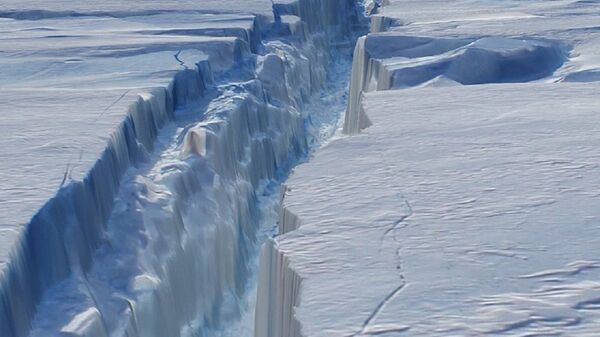Targeted engineering projects to hold off glacier melting could slow down the collapse of ice sheets and limit sea-level rise, according to a new study published in the European Geosciences Union journal The Cryosphere.
While an intervention similar in size to existing large civil engineering projects could only have a 30% chance of success, a larger project would have better odds of holding off ice-sheet collapse. But study authors Michael Wolovick and John Moore caution that reducing emissions still remains key to stopping climate change and its dramatic effects.
Their unthinkable idea is glacial geoengineering: making changes to the geometry of the seafloor near glaciers that flow into the ocean, forming an ice shelf, to prevent them from melting further. Some glaciers, such as the Britain- or Florida-sized Thwaites ice stream in West Antarctica, are retreating fast. This could have dramatic effects to the millions of people living in the world's coastal areas.
Sputnik: Tell about this report then into the sea levels?
John Moore: Well probably the largest threat from a warming climate is going to be rising sea levels around the world, there are forecasts that by the end of this century the cost of protecting global coastlines could be around 50 billion dollars per year, that’s huge expense. We wanted to see if there was any alternative instead of protecting the whole globes coast, can we prevent the ice melting to raise the seas, can we preserve the ice in Antarctica and Greenland instead.
John Moore: Well the problem is that a large part of Antarctica, equivalent of 5 meters of a rising sea level is on an unstable bedrock slope. Once it starts slipping into the ocean and carving icebergs, even if we lower the temperature it won’t stop that ice falling into the sea, so you need to do an alternative method that just turning down the temperature which is of course desirable for many reasons. The only alternative way to preserve this ice is to give it some stability that will help to keep it on the land.
Sputnik: When could your plans and suggestions be put in place?
John Moore: Well it is possible but it wouldn’t be sensible to do now, we’re not talking science fiction where we need new technologies, they exist at present. The kind of technology people use for example to make Hong Kong’s new airport which is built on what used to be the sea, it is an artificial Island. We know how to make giant dams to control flood in the rivers, so all this technology actually exists. What we don’t know yet is the best place yet to make these walls or these extra buffers that are needed and that is something that is going to take at least a decade of research and investigation because its Antarctica, it’s not on our doorstep, it’s a difficult place to explore and a difficult place to do the engineering. Make no mistake if we wanted to do it and spend the resources on it, it could be done.





